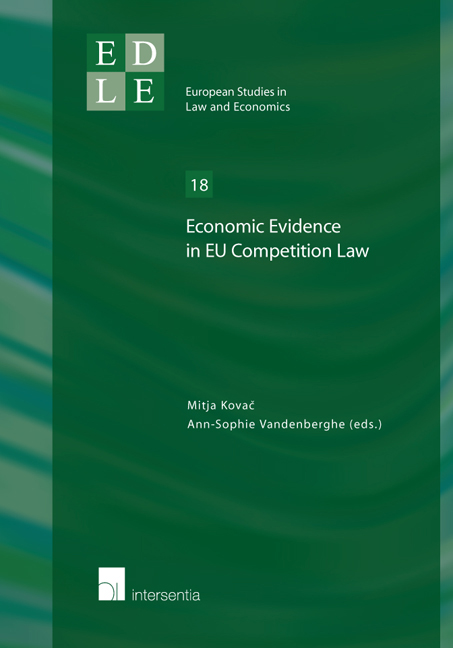Book contents
- Frontmatter
- Dedication
- Preface
- Contents
- List of Contributors
- General Introduction
- PART I ECONOMIC METHODS IN COMPETITION LAW
- PART II ECONOMIC EVIDENCES IN COMPETITION LAW
- PART III INSIDER TRADING, CARTELS AND CRIMINALISATION
- PART IV PRELIMINARY RULINGS AND STATE AID CONTROL
- PART V ECONOMIC EVIDENCE, ENFORCEMENT PROBLEMS AND NATIONAL COURTS
- Chapter 15 Google, Competition Policy and the Owl of Minerva
- Chapter 16 The Interaction between EU Regulatory Implants and the Existing Croatian Legal Order in Competition Law
- Chapter 17 Empiric Assessment of the Role of Economic Analysis in Russian Competition Law
- Chapter 18 Challenges of Private Enforcement of Antitrust in Slovenia
- Chapter 19 On the Need of EU Wide Best Practices in Competition Law Enforcement Proceedings
- Index
Chapter 16 - The Interaction between EU Regulatory Implants and the Existing Croatian Legal Order in Competition Law
from PART V - ECONOMIC EVIDENCE, ENFORCEMENT PROBLEMS AND NATIONAL COURTS
Published online by Cambridge University Press: 21 September 2018
- Frontmatter
- Dedication
- Preface
- Contents
- List of Contributors
- General Introduction
- PART I ECONOMIC METHODS IN COMPETITION LAW
- PART II ECONOMIC EVIDENCES IN COMPETITION LAW
- PART III INSIDER TRADING, CARTELS AND CRIMINALISATION
- PART IV PRELIMINARY RULINGS AND STATE AID CONTROL
- PART V ECONOMIC EVIDENCE, ENFORCEMENT PROBLEMS AND NATIONAL COURTS
- Chapter 15 Google, Competition Policy and the Owl of Minerva
- Chapter 16 The Interaction between EU Regulatory Implants and the Existing Croatian Legal Order in Competition Law
- Chapter 17 Empiric Assessment of the Role of Economic Analysis in Russian Competition Law
- Chapter 18 Challenges of Private Enforcement of Antitrust in Slovenia
- Chapter 19 On the Need of EU Wide Best Practices in Competition Law Enforcement Proceedings
- Index
Summary
INTRODUCTION
It is a well-known fact that the major jurisdictions in the world, and most notably the USA and the EU, act as leaders in the world's ideological convergence, reshaping many smaller nations’ economic, political, and cultural climate according to its own image. Without having philosophical arguments on the desirability of such processes, it can be stated that they were and remain a success. For many years we have been witnessing the European enlargement project – the integration of former transitional countries into the economic and political union of western market economies. This very demanding project and the most desired goal for candidate and accession countries was performed mostly through the implementation of EU rules into the local legal systems not tailored to local problems, and what is more, it is often not compatible with the local institutional framework. The implementation of laws is rarely an issue, as it is often done by way of pure translation of foreign rules; however, problems tend to occur at the enforcement stage. Adopting foreign legal solutions is always a sensitive question as it requires not only the adjustment of legal rules, but also the development of institutions, substantive capacity building and sometimes major changes in values and thinking.
One of the most noticeable areas in this regard is the competition law regime, as it plays a central role in the protection and effectiveness of the European market. Today few would contest the necessity for convergence of competition law regimes in Europe, as processes are essential for the proper functioning of its market. With this in mind, the right question is not whether convergence is a necessary and legitimate aim, but rather what are the problems in achieving this aim and what is the level of success in the accession countries.
The authors will attempt to illustrate the difficulties in harmonising competition laws and their enforcement in the case of Croatia, a country which has undergone a number of substantial changes in the area of competition law over the last decade, in order to fully comply with the harmonising obligation and render effective thereby implemented rules.
- Type
- Chapter
- Information
- Economic Evidence in EU Competition Law , pp. 327 - 356Publisher: IntersentiaPrint publication year: 2016
- 2
- Cited by



